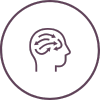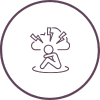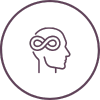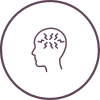
Written by:

Medically Reviewed by:
Last Updated:
January 15th, 2025
Mental health and Addiction | Combinations and Treatments
Mental health disorders and addiction are like two dancers entwined in a dark and complex dance, each one influencing and intensifying the other’s movements. This intricate relationship often makes it difficult for sufferers to seek help but rest assured, recovery is possible. At Recovery Lighthouse, our compassionate professionals specialise in helping people untangle the knot of co-occurring mental health and addiction issues and guiding them towards a healthier, happier life.
Understanding the connection between addiction and mental health
The term “dual diagnosis” is used to describe the presence of both a mental health disorder and a substance use disorder. This vicious cycle can begin when individuals turn to drugs or alcohol to cope with the symptoms of their mental health issues. Substance use can then exacerbate the underlying condition, creating a feedback loop that intensifies both disorders. The simultaneous presence of these conditions makes diagnosis, management and recovery more complicated requiring specialised care and support.
Common dual diagnosis addiction and mental health disorders
Addiction can co-occur with every type of mental health disorder but the following dual diagnoses are very common:
ADHD and addiction
For those living with ADHD, the constant battle for focus and control may lead to substance use as a means of self-medication. Unfortunately, this often backfires, worsening impulsivity and exacerbating ADHD symptoms. Click the button below to learn more.
Anger management and addiction
While substances might provide short-term relief or a sense of control, they often intensify feelings of anger and reduce impulse control, creating a destructive cycle. Click the button to learn more.
Anxiety and addiction
Anxiety can make individuals feel trapped in a cycle of worry, and drugs or alcohol may seem like an escape. However, substances often only provide temporary relief, ultimately exacerbating anxiety and creating a cycle of dependence. Click the button below to learn more.
Autism and addiction
Individuals with autism spectrum disorder (ASD) may turn to substances as a means of coping with social and sensory challenges, leading to addiction. However, this approach can worsen the symptoms of ASD, making it even more difficult for the affected person to navigate their daily life.
BDD and addiction
Those with suffering from dysmorphic disorder (BDD) often look to alcohol and drugs as a coping mechanism for the intense distress and preoccupation with perceived flaws in their appearance. Substance use might provide temporary relief from anxiety or negative self-perceptions.
Bipolar and addiction
Substance use may appear to offer respite from the extreme highs and lows of bipolar disorder. However, it usually adds fuel to the fire, causing mood swings to become more pronounced and unpredictable. Click the button below if you would like to learn more about this dual diagnosis.
Borderline Personality disorder and addiction
Substance use can provide temporary relief from the emotional turbulence of personality disorders. However, it only serves to intensify symptoms.
Co-dependency and addiction
Co-dependent individuals may become ensnared in the addiction of their loved ones, using substances to cope with the emotional turmoil.
Depression and addiction
Individuals with depression may use substances as a way to escape their emotional pain. Ironically, these substances often deepen the darkness, making it harder to find the path towards healing.
Grief and addiction
Click the button below to learn about grief and its links to addiction.
Insomnia and addiction
Click the button below to learn about insomnia and its links to addiction.
OCD and addiction
Click the button below to learn about OCD and its links to addiction.
Post Traumatic Stress Disorder and addiction
Drugs and alcohol may seem like a refuge from the nightmares of PTSD, but in reality, they only serve to prolong the suffering. Substances can impede the healing process and perpetuate the cycle of trauma. Click below to learn more.
Schizophrenia and addiction
Substance use may offer a temporary escape from the unsettling symptoms of schizophrenia, but it ultimately distorts reality further, worsening hallucinations and delusions. Click the button below to learn more.
Self-harm and addiction
Individuals who engage in self-harm may turn to substances as a means to cope with overwhelming emotions, numb psychological pain, or escape feelings of distress. Although substance use might offer a temporary sense of relief or distraction, it often deepens emotional turmoil and exacerbates the underlying issues driving self-harm.
Stress and addiction
Click the button below to learn about stress and its links to addiction.
Addiction and suicide
Click the button below to learn about suicide and its links to addiction.
Treating addiction with co-occurring mental health conditions
Addressing addiction in the presence of mental health conditions demands unique considerations and a multifaceted treatment approach. Recovery Lighthouse rehab treatment programme offers a variety of addiction therapies that not only target substance abuse but also have positive effects on mental health, promoting a more comprehensive and lasting recovery. These include:
Cognitive-behavioural therapy (CBT)
CBT is a powerful tool that helps you identify and modify negative thought patterns and behaviours. By developing healthier coping strategies, you can reduce substance use and improve your overall mental health, learning to manage emotions and reactions more effectively.
Dialectical behaviour therapy (DBT)
Initially developed to treat borderline personality disorder, DBT has been adapted for addiction treatment. DBT focuses on teaching you skills such as distress tolerance, emotional regulation, and interpersonal effectiveness. These skills can help you manage your emotions better, reducing the likelihood of turning to substances for relief and enhancing your overall mental health.
Group therapy
Group therapy offers you the opportunity to share experiences, learn from others facing similar challenges and develop a sense of camaraderie and support. By participating in group therapy, you can gain valuable insights into your addiction and mental health issues, learn new coping strategies and benefit from the shared wisdom of your peers. This supportive environment fosters a sense of belonging and improves mental well-being, leading to a more successful recovery journey.
Holistic therapies
Holistic therapies, such as mindfulness meditation, yoga and art therapy can offer significant benefits for individuals with co-occurring mental health and addiction disorders. These therapies promote relaxation, stress reduction and self-awareness enabling you to better manage your emotions and resist the urge to use substances. By integrating holistic therapies into a comprehensive treatment plan, you can enhance your mental health and overall well-being, supporting long-lasting recovery.
Family therapy
Family therapy involves your entire family unit in the recovery process, providing education, support and communication tools. By fostering understanding and empathy, family therapy can help rebuild relationships strained by addiction and mental health issues. This improved family dynamic serves as a vital source of support for you during your recovery, leading to better mental health outcomes and a decreased likelihood of relapse.
Supporting a loved one with co-occurring mental health and addiction disorders
Helping a loved one facing co-occurring mental health and addiction disorders can be challenging, but with the right approach, you can provide the support they need.
Here’s how to effectively support someone with co-occurring disorders:
Educate yourself
Take the time to research and understand the specific mental health disorder and addiction your loved one is dealing with. This knowledge will give you insight into their struggles and help you provide appropriate support. Learn about the symptoms, treatments and possible outcomes, as well as ways to communicate effectively with someone experiencing these issues.
Encourage treatment
Gently encourage your loved one to seek professional help by emphasising the importance of addressing both their addiction and mental health needs. Discuss the benefits of comprehensive treatment and offer to help them find appropriate treatment.
Practise empathy
Being compassionate and understanding is essential when supporting someone with co-occurring disorders. Validate their feelings and experiences while avoiding judgment or criticism. Listen actively to their concerns and fears and reassure them that you’re there to help. This empathetic approach can help build trust and make your loved one feel more comfortable opening up about their struggles.
Seek support
Caring for someone with co-occurring disorders can be emotionally challenging and, at times, overwhelming. Join a support group or seek therapy for yourself to gain perspective, develop coping strategies and receive guidance from others who understand your situation. Taking care of your own mental and emotional health will enable you to better support your loved one on their journey towards recovery.
By following these guidelines, you’ll be better equipped to provide the essential support your loved one needs. Remember, recovery is a long-term process, and your understanding and patience can make all the difference in helping your loved one overcome the challenges of co-occurring mental health and addiction disorders.
Taking the first step towards recovery
At Recovery Lighthouse, our team of dedicated professionals is ready to help you navigate the path towards healing, providing tailored treatment for your unique needs. Don’t let addiction and mental health disorders dictate your life anymore – take the first step today and embrace the possibility of a brighter tomorrow.
Frequently asked questions












